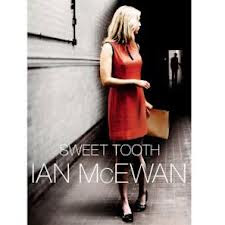
You will observe that I am really losing the plot. Spy novels?!? When have I ever read spy novels? And wait, I even just read another one that I’ve haven’t blogged about yet (I’ll give you a clue, someone comes in from the cold). Anyway! Ian McEwan rather bravely decides to write an entire novel as a woman. Impressively, he more or less succeeds. It’s the 1960s, and some young woman is at Cambridge. She has an affair with her elderly professor, and he suggests her for MI5. She is a hesitant and unwilling spy, which is a good thing, because once she passes the rigorous interview process she finds that woman are only allowed to be secretaries anyway. One really forget how much we today owe to our mother’s generation. Eventually she is assigned to liaise with a writer, who the service feels is likely to write the right sort of books. The plan is to give him money, without him being aware where it comes from, so as to encourage writing of his kind, which they believe will foster the right kind of thinking – anti-communist, pro-western values, etc etc. Here is where it gets interesting, because unfortunately she falls madly in love with this writer, and so not telling him who is paying the bills becomes more and more complicated. Eventually he finds out, and a weird sort of double bluff begins, which ends the book with an unexpected twist.
The young woman at the centre of the book is chosen for this project with the writer because she is an enthusiastic reader, and this book is very interesting on the subject of reading as a defining activity. It made me realise I have read many books on what it means to be a writer, but very few on what it means to be a reader. Here’s the woman on he reading: “I could take a block of text or a whole paragraph in one visual gulp. It was a matter of letter my eyes and thoughts go soft, like wax, to take the impression fresh off the page. To the irritation of those around me, I’d turn a page every few seconds with an impatient snap of the wrist. My needs were simple. I didn’t bother much with themes or felicitous phrases and skipped fine descriptions of weather, landscapes and interiors. I wanted characters I could believe in, and I wanted to be made curious about what was to happen to them.” This struck me, because it is pretty much exactly how I read. I’ve never understood people who think about what they read; the idea is to not have your own thoughts, but someone else’s.

I read Ian's Saturday and was not very impressed, though I've enjoyed some of his books.
This book had me on and off my seat.It frustrated me, enthralled me. I couldn't let it go.Bitter tooth! bravo!